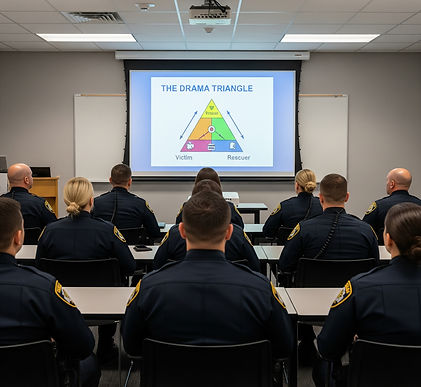Mindfulness-Based
Wellness & Resiliency

MBWR Training
Delivered in-person, online, or hybrid, an evidence-based interactive program designed to engage and train participants in a broad range of simple, practical communication, stress management, health enhancement, and resilience-building skills. Research indicates these skill sets, as trained in MBWR®, improve performance and quality of life, both on and off the job. Additionally, benefits include significantly reducing the risk of burnout and other serious workplace stress injury and trauma-related health risks faced by corrections personnel, law enforcement, first responders, re-entry, treatment, and public service professionals.
MBWR 10-Week (32hr) Program Structure
STEP ONE: ONSITE TRAINING
A full-day onsite introductory Mindfulness-Based Wellness & Resiliency Training delivered by CMPS Training Director Fleet Maull or other CMPS Certified Trainers.
STEP TWO: COMMUNITY OF PRACTICE (COP) GROUPS
Eight 2-hour sessions (approximately 10 participants per group) facilitated by CMPS-trained facilitators, focusing on the following skills:
SELF-CARE SKILLS
For Effective Stress Management & Resilience
-
Physical Resilience – nutrition, exercise, hydration, breathing, limiting alcohol & tobacco
-
Mental Resilience – mindfulness exercises, positive attitude, brain training, & education
-
Emotional Resilience – empathy, emotional intelligence, interpersonal relationship skills
-
Spiritual Resilience – faith & spirituality, gratitude, forgiveness & letting go, community, nature
SHIFT-READINESS SKILLS
For Effective Stress Management & Optimal Performance
-
Self-Awareness – mindful attention, presence, reframing, positive outlook
-
Self-Management – manage triggers, emotion regulation, defuse drama
-
Social Awareness – body language, empathic listening, awareness of the feelings & needs of others
-
Relationship Effectiveness – effective communication & conflict management skills
STEP THREE: FINAL ONSITE TRAINING
Debrief and graduation led by CMPS Training Director Fleet Maull or other CMPS Certified Trainers.
Cost varies based on the needs of each organization.
Deliverables
✔ A strong foundation for a personnel/agency/department culture shift from stress, burnout, denial, un-treated trauma exposure, and the resulting emotional problems, health risks, and health costs to a staff culture of healthy self-management and self-care, emotionally and socially intelligent communication, effective stress and conflict management, and overall staff wellness and safety.
✔ A measurable reduction in staff burnout (empathy fatigue). Improved staff morale and improved performance outcomes achieved by healthier, more resilient, and more emotionally and socially intelligent and skillful staff.
✔ Prevention of, and measurable reduction in, suicide, PTSD-related incidents, and trauma and stress caused by family discord, domestic violence, substance abuse, etc.
✔ Reduction in costs for chronic stress or burnout related to staff absences, lost time, injuries, staff turnover, and related health care costs.
✔ Overall long-term health care savings through improved wellness and preventive health care programs.


Specific Skills
-
Attention, focusing, and mindfulness skills
-
Physiology management and balancing skills
-
Breath regulation and other stress management skills and practices
-
Self-care and wellness practices
-
Cognitive reframing skills and positive attitudinal skills
-
Emotion regulation and self-management skills
-
Listening – engaged, empathic, and reflective listening skills
-
Effective communication skills
-
Difficult conversation skills
-
Conflict de-escalation and conflict management skills
Training Content
-
Basic mindfulness practice training presented in an evidence-based, trauma-informed manner similar to that which is now being provided in many areas of U.S. society, including healthcare, K-12 education, corporate wellness and performance programs, law enforcement, corrections, etc.
-
Evidence-Based Mindfulness-Based Wellness & Resiliency® (MBWR) training designed to enhance physical, mental, emotional, and spiritual resilience leading to improved health, wellness, morale, and performance outcomes.
-
Evidenced-based Mindfulness-Based Emotional Intelligence (MBEI) training designed to increase the capacity for self-awareness, self-management (including emotion regulation), social awareness (reading behavioral cues and empathy training), and effective communication and interpersonal relations management.
-
An introduction to the neuroscience of stress and stress management and the scientific basis for mindfulness, empathy, and compassion training.
-
Council dialog training: basic training in the practice of council dialog, a modern practice derived from many ancient forms of communicating in a circle. Sometimes referred to as “Listening Circles”, the practice and structure of council will provide a safe container for effective peer support, learning, and skill-building in the Community of Practice (CoP) groups.
-
Resiliency and stress management training.
-
Burnout prevention and recovery training.
-
Accountability and self-empowerment training.
-
Family applications: mitigating family impact of on-the-job stress and trauma, developing healthy family communication, and conflict management.
-
Developing healthy support systems and resources.



